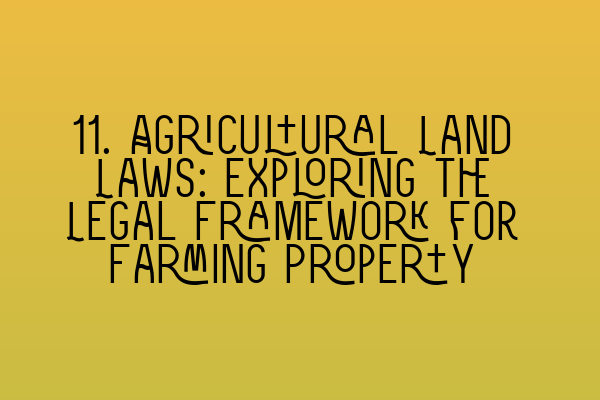11. Agricultural Land Laws: Exploring the Legal Framework for Farming Property
Agricultural land holds significant value in the realm of property law. Understanding the legal framework for farming property is essential for farmers, landowners, and solicitors specializing in property and land law. In this blog post, we will delve into the intricacies of agricultural land laws, exploring the various regulations and considerations pertinent to farming property.
1. Definition of Agricultural Land
Before we delve into the legal aspects of agricultural land, let us establish a clear definition. Agricultural land refers to land that is mainly used for farming or agricultural purposes. It encompasses all types of agricultural activities, including crop cultivation, livestock rearing, and horticulture.
2. The Importance of Agricultural Land Laws
Agricultural land laws play a crucial role in regulating the use, transfer, and protection of farming property. These laws ensure sustainable farming practices, protect farmers’ rights, and preserve the agricultural landscape. Without appropriate legislation, agricultural land could be subject to misuse, exploitation, and deterioration.
3. Regulatory Bodies and Policies
Agricultural land laws in the UK are primarily governed by regulatory bodies such as the Department for Environment, Food and Rural Affairs (DEFRA), the Rural Payments Agency (RPA), and local planning authorities. Additionally, policies such as the Common Agricultural Policy (CAP) and the Environmental Stewardship Scheme (ESS) provide guidelines for agricultural practices and land management.
4. Agricultural Holdings Acts
The Agricultural Holdings Acts are key pieces of legislation that protect tenants’ rights and regulate the relationships between landlords and agricultural tenants. The acts offer provisions for secure tenancies and provide safeguards against unfair eviction or rent increases. Understanding the rights and obligations under these acts is vital for both landlords and tenants in the agricultural sector.
5. Environmental Considerations
Environmental considerations are vital in agricultural land laws. Farmers and landowners must adhere to various environmental regulations to protect wildlife, promote sustainability, and prevent pollution. These regulations include restrictions on pesticide use, regulations on livestock waste management, and guidelines on conservation areas and protected species.
6. Farm Business Tenancies
Farm Business Tenancies (FBTs) are another crucial aspect of agricultural land laws. FBTs provide a legal framework for the rental of agricultural land and buildings. These tenancies grant both the landlord and the tenant certain rights and responsibilities. Understanding the intricacies of FBTs is essential in negotiating fair and secure rental agreements.
7. Succession Planning
Succession planning is an important consideration for farmers looking to pass on their agricultural property to the next generation. Agricultural land laws provide provisions for succession, ensuring the smooth transfer of farming property and protecting the interests of both parties involved. Seeking legal advice to navigate the complexities of succession planning is highly recommended.
8. Land Use Change and Planning Permission
Changing the use of agricultural land, such as converting it into non-agricultural use or developing it for residential purposes, often requires planning permission. Local planning authorities regulate land use change to ensure that agricultural land is protected and utilized appropriately. Understanding the planning permission process and the associated agricultural land laws is crucial when considering land use change.
9. Taxation and Agricultural Property Relief
Taxation plays a significant role in agricultural land ownership and transfer. Agricultural Property Relief (APR) offers tax advantages to farmers and landowners by reducing inheritance tax on agricultural property transfers. Understanding the provisions and requirements for APR is vital in maximizing tax efficiency and protecting the value of agricultural assets.
10. Dispute Resolution
Disputes related to agricultural land can arise between landlords and tenants, neighboring landowners, or regulatory authorities. Understanding the processes and options for dispute resolution, such as mediation or arbitration, is essential in resolving conflicts and protecting the interests of all parties involved.
11. Legal Advice and Expertise
Gaining a comprehensive understanding of agricultural land laws can be a complex task. It is advisable for farmers, landowners, and solicitors to seek legal advice and expertise from professionals specializing in property and land law. Professional guidance ensures compliance with regulations, protects rights, and helps navigate the intricacies of agricultural land transactions and disputes.
At SQE Property Law & Land Law, we offer comprehensive legal services for agricultural land matters. Our experienced solicitors possess in-depth knowledge of the legal framework surrounding farming property and can provide expert advice and assistance in all aspects of agricultural land law.
If you require guidance or assistance with agricultural land laws, feel free to contact us today. We are committed to ensuring the best outcome for our clients in all their agricultural land endeavors.
